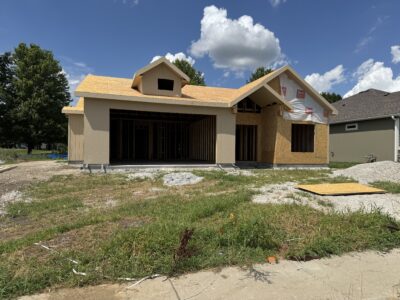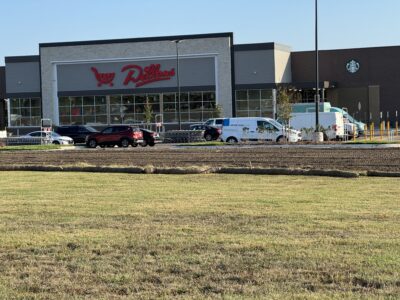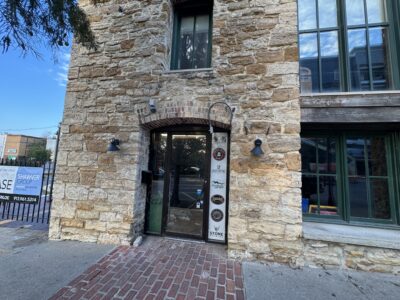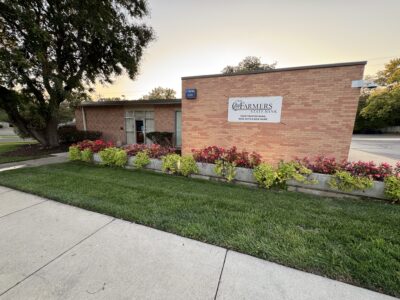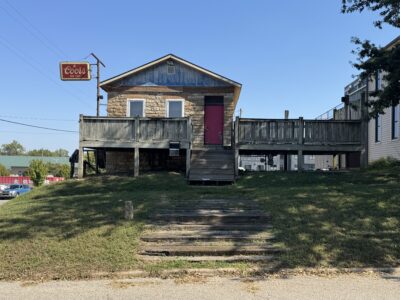
Thanks to Panasonic plant, De Soto approves largest property tax rate decrease in city’s history; why that may matter in Lawrence

photo by: John English/Journal-World
The Panasonic battery plant in De Soto is pictured on Sept. 9, 2024.
Here in Lawrence and Douglas County, we’ve been waiting on the impact from Panasonic’s new $4 billion, 4,000-job electric vehicle battery plant that is under construction in nearby De Soto.
Parts of Lawrence are just a 20-minute drive from the massive plant, and most of Eudora is less than half that distance. But, thus far, neither community has seen much in terms of direct impact from Panasonic. Housing construction for workers of the plant has not taken off, and neither community has become home to a big supplier of the plant, for example.
Perhaps, though, Lawrence and Douglas County are about to feel an impact from the plant. It may show up, however, in an unexpected place: The mail boxes of De Soto property owners.
Next month, property owners will start receiving their 2024 property tax bills, and residents of De Soto are in line for a big decrease. In fact, De Soto officials are saying it is the largest tax rate decrease in the city’s history, and they attributing it to the increased economic activity produced by the Panasonic plant.
How does that impact us here in Douglas County? Mainly on the competition front. If Lawrence and Douglas County want to get a certain percentage of the new businesses and employees that move to the area over the next decade due to Panasonic, it is reasonable to believe that we are going to be competing with De Soto.
It also is reasonable to believe the new residents — but perhaps particularly new businesses — will consider the tax rates of De Soto versus Lawrence and Eudora when considering where to locate.
This latest announcement of a big tax cut in De Soto really put a point on that for me. It caused me to look at tax rates in Johnson County more closely than I have in the past, and I was struck by how much lower the tax rates are once you cross the Johnson County line.
For now, let’s just focus on De Soto. According to a press release from the city of De Soto, the city council there voted to decrease the city’s property tax rate for 2024 to 13.78 mills. That’s down from 19.8 mills a year ago. In other words, that’s a 30% reduction in the property tax rate.
Despite the property tax rate decrease, the city approved a budget that provides for a 30% increase in law enforcement funding and a $250,000 increase in the city’s road maintenance fund, according to a press release from the city of De Soto.
City officials are attributing the ability to decrease taxes to the large amounts of economic activity that is happening at and around the plant. That includes $250 million worth of infrastructure improvements that are happening to serve the plant. That work — plus the hundreds of workers who are in the community building those projects — has caused the amount of retail sales in the city to skyrocket. As I reported last week, De Soto has experienced about a $36 million increase in retail sales thus far in 2024 which has allowed De Soto’s sales tax collections to grow by more than $600,000.
Importantly, De Soto officials said that the reduction in the property tax rate is large enough to more than offset the rising home values in the De Soto area. The city said the average home value in De Soto had been $309,400, and the owner of such an average home would pay about $705 in city property taxes under the old rate.
Now, the city estimates the average value of a home in De Soto has risen to $332,000. But, due to the lower tax rate, the owner of such an average home would pay about $525 in city property taxes.
That’s a reduction of $180 or about 25% from a year ago.
While that is interesting, the more striking numbers are when you start comparing De Soto’s tax rates to those in Douglas County. The city of Lawrence has a mill levy right at 33 mills and the city of Eudora has a mill levy of 39 mills. De Soto’s is now just under 14 mills. In other words, Lawrence’s property tax rate is about 135% higher than De Soto’s and Eudora’s is about 175% higher.
Those differences are easier to comprehend when looking at that $332,000 home that is paying $525 in city property taxes in De Soto. In Lawrence, that home would pay $1,267 in city property taxes. In Eudora, it would pay $1,489 in city property taxes.

photo by: Chad Lawhorn/Journal-World
New home construction is shown in Eudora’s Shadow Ridge subdivision in this 2022 file photo.
However, you can argue that is not a truly fair comparison. Home values in Johnson County are higher, generally, than in Douglas County. Here’s what I’ve done to try to account for that. I’ve taken the median home value for each of the three cities, as determined by the most recent U.S. Census report for each community, even though the Census estimates are imperfect.
The Census actually lists the median home value in De Soto at about $352,000. That homeowner would pay about $558 in city taxes. In Eudora, the median home value is listed at about $217,000. That homeowner would pay about $973 in city taxes. In Lawrence, the median home value is about $294,000, according to the Census. That homeowner would pay $1,123 in city taxes.
Even when you account for the higher home values in De Soto, the city taxes in Lawrence and Eudora are about double what they are in De Soto.
The same holds true for taxes on businesses. Here are the city property taxes a business would pay on a $1 million commercial property in each of the three cities: Eudora, $9,750; Lawrence, $8,299; De Soto, $3,445.
Those numbers could be important as Lawrence tries to compete for industrial businesses and suppliers who want to be near the Panasonic plant. If Lawrence wants to get into that competition, it should recognize that De Soto goes in with a couple of big advantages — it has sites much closer to the Panasonic plant, and its tax rates are about half of Lawrence’s.
To compete, Lawrence may have to get very aggressive in terms of the type of property tax abatements it is willing to offer a company to locate here, which has not always been Lawrence’s mindset.
It also is worth asking whether such aggressiveness would be enough? The difference in tax rates is really stark, and it is not just at the city level. Johnson County’s countywide property tax rate for 2024 is right at 24 mills. With a mill levy for Johnson County Community College added onto that, it grows to about 32 mills. Douglas County’s countywide rate — even with a significant reduction by the Douglas County Commission — is at about 41 mills.
Lawrence may need to build a strategy around competing in ways other than its tax environment. Maybe that is a strategy built around quality of life factors, but more likely it will be tied to companies that want to capitalize on research happening at the University of Kansas — which indeed could include Panasonic.
Lawrence indeed may benefit greatly from Panasonic in the future, but Lawrence taxpayers are not going to feel those benefits the same way De Soto taxpayers will this year.


